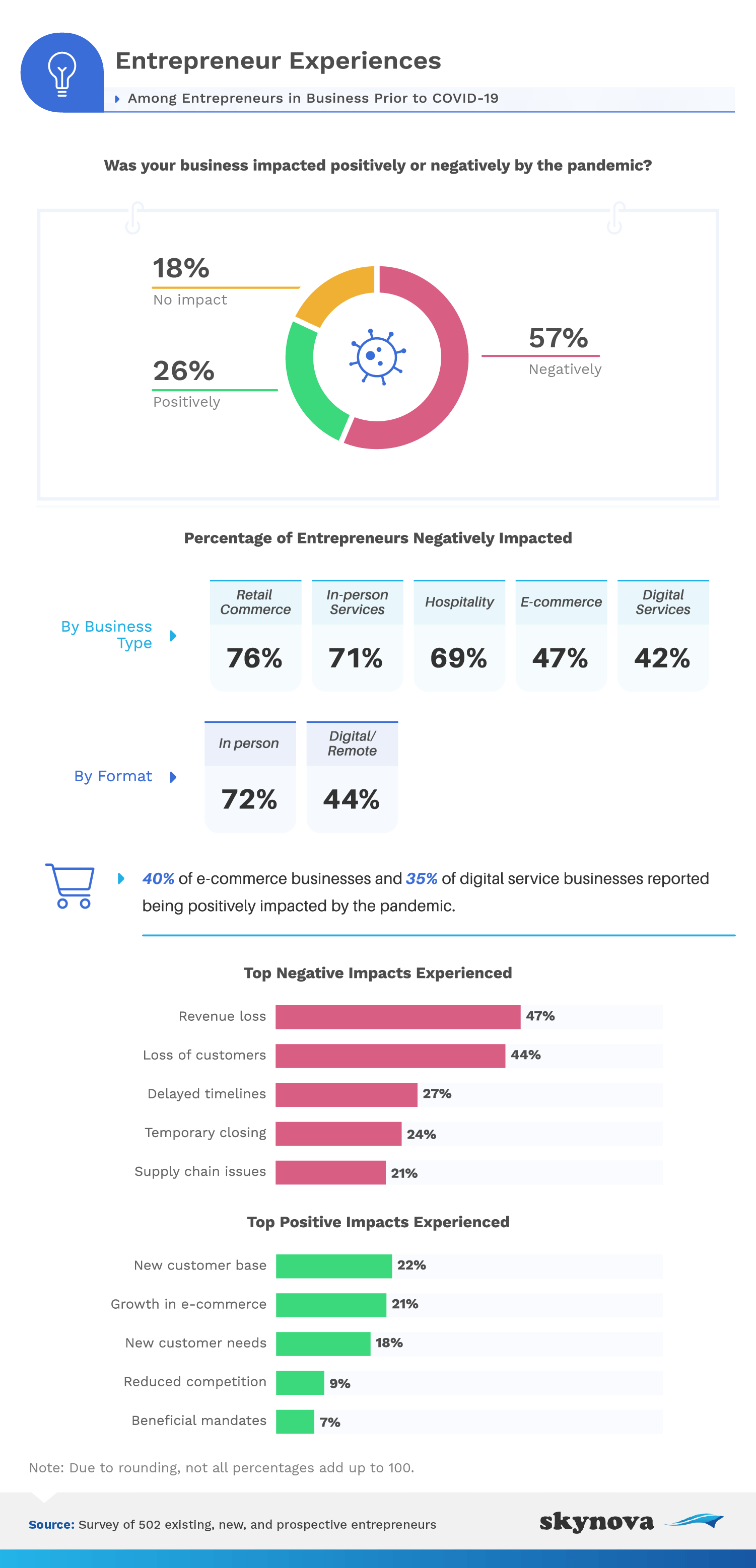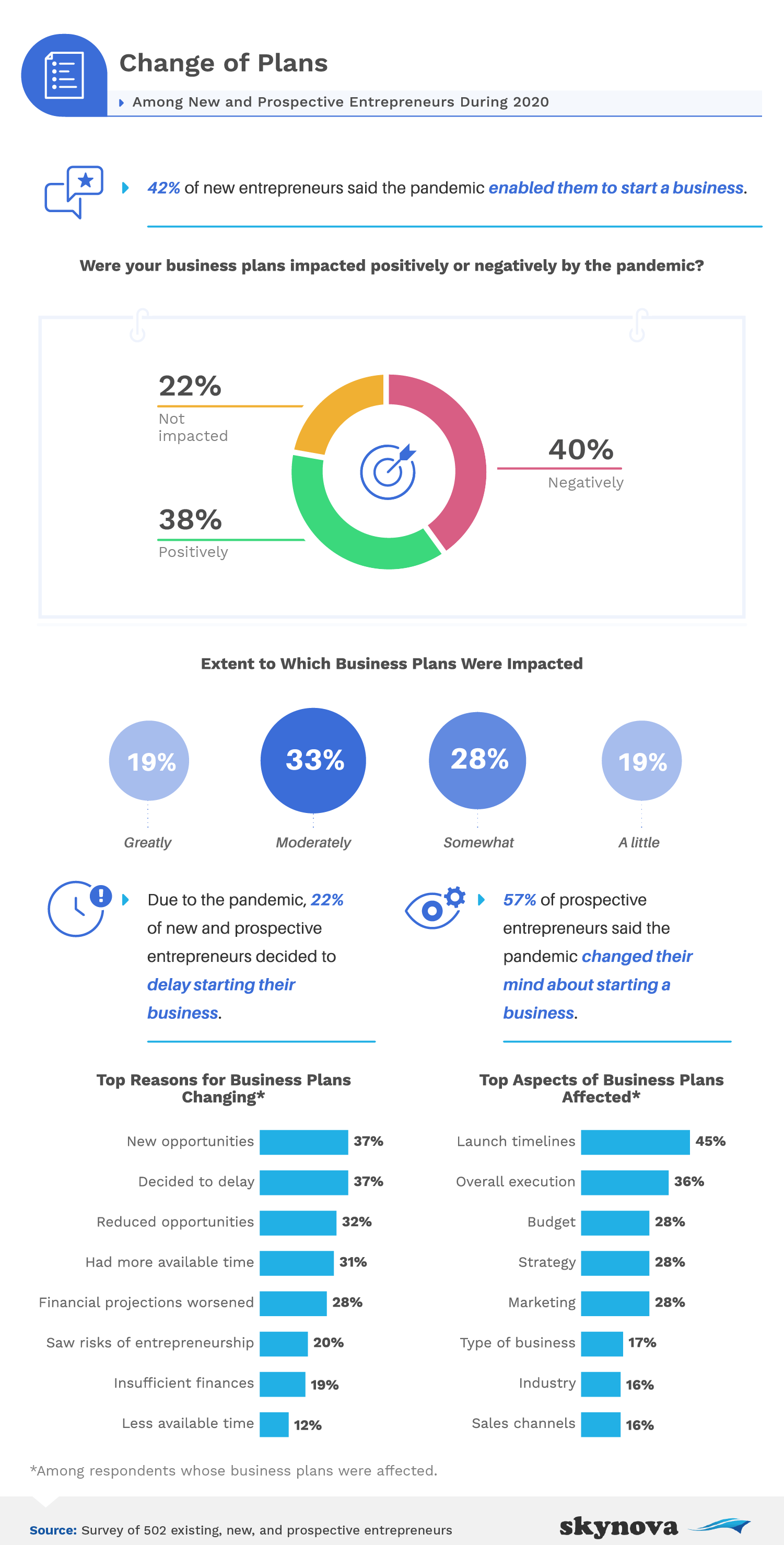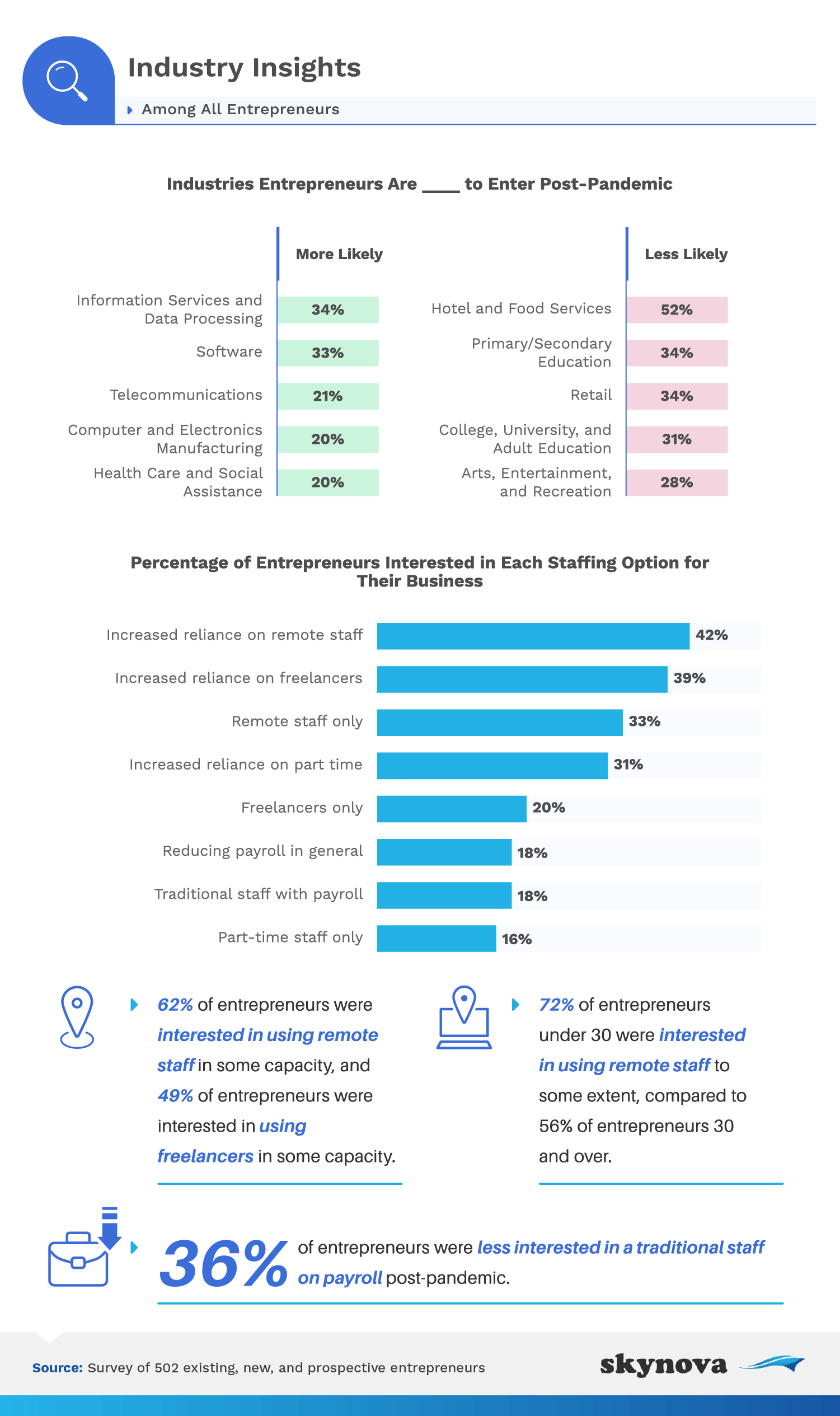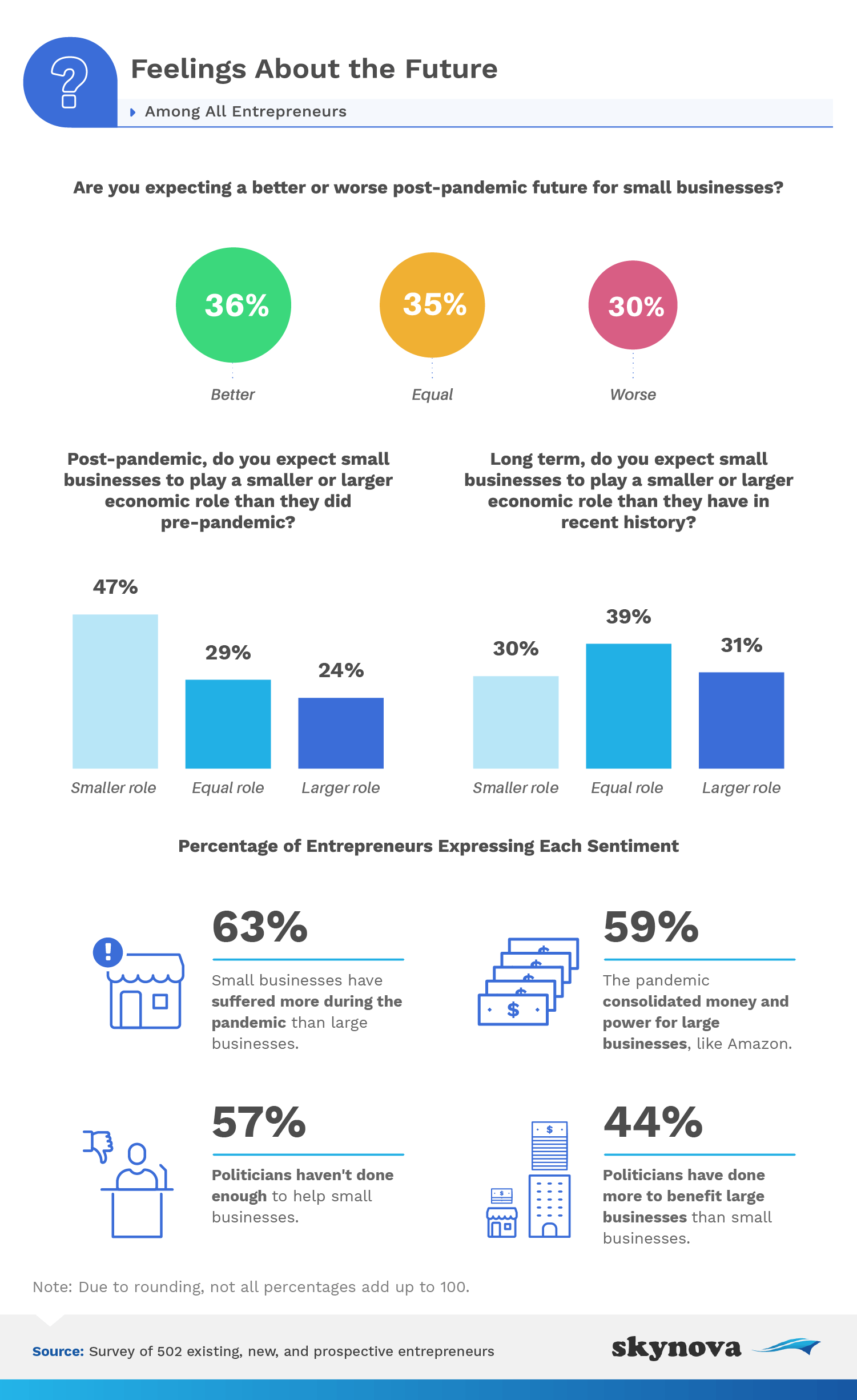The COVID-19 pandemic entirely changed the way most people approached, well, everything. The economic and business consequences of the COVID era have been immense, and businesses have taken a huge hit. For small businesses and entrepreneurs, it has proven to be a particularly difficult time from which it will take years to fully recover.
Q1 2021 hedge fund letters, conferences and more
Impact Of The Pandemic On Entrepreneurship
To learn just how the pandemic has impacted entrepreneurs and what the future looks like for entrepreneurship in the U.S., Skynova surveyed over 500 people about all aspects of the world of business and how the pandemic has affected it.
Overall Experiences
Among respondents, 57% said they were negatively impacted by the pandemic. While 18% said they weren’t impacted at all, a shocking 26% said they felt the pandemic had a positive effect on their business. Overwhelmingly, the biggest industry impacted among entrepreneurs who saw negative effects from the pandemic was retail. Seventy-six percent of entrepreneurs who were negatively impacted said their business was in retail, while 71% said they provided in-person services, 69% were in the hospitality industry, 47% worked in e-commerce, and 42% in digitals services.
Interestingly, 40% of e-commerce businesses and 44% of digital/remote entrepreneurs said they were positively impacted by the pandemic. The biggest favorable impact among respondents who felt the pandemic had affected them positively cited a new customer base. Twenty-two percent said as much, while 21% felt that a growth in e-commerce was responsible for a positive experience.
The top negative experience for entrepreneurs was overwhelmingly revenue loss, with 47% highlighting that as the thing that impacted them the most. Forty-four percent said a loss of customers was to blame, while 27% blamed delayed timelines, 24% cited temporary closings, and 21% said supply chain issues weighed heavily.
Switching Gears
Pivoting as a business can be a difficult thing to do under any circumstances, but having to adjust your business plan and model amid a pandemic may seem unimaginable. For many, though, this was the reality of the COVID-19 pandemic. While 42% of new entrepreneurs surveyed by Skynova said they felt the pandemic enabled them to start a new business, 40% said the pandemic negatively impacted their business plans. Thirty-eight percent, however, felt that the pandemic positively impacted their business plans.
Encouragingly, 33% of respondents said they felt their business plans were only moderately affected, and less than 1 in 5 said they were greatly impacted. However, 22% of new entrepreneurs said the pandemic delayed the start of their business, and a remarkable 57% of prospective entrepreneurs said it made them change their mind altogether about starting a business.
A change in business plans can be a scary thing, and the reasons for such a shift among respondents in the survey varied greatly. Thirty-seven percent said the top reason for their business plans changing was either new opportunities or a decision to delay, while 32% said reduced opportunities had the greatest impact. Twenty-eight percent said their financial projections took a negative hit, forcing them to shift gears.
The Industries of the Future
It’s not particularly surprising that many prospective entrepreneurs are pivoting toward other industries, as many industries have either become virtually obsolete or much riskier as a result of the pandemic. Which industries were entrepreneurs most likely to attempt to enter post-COVID?
As it turns out, 34% said they felt that the information services and data processing industry was the right move for them, while 33% said the software industry seemed viable. Twenty-one percent said they could see themselves entering the telecommunications industry, and 20% cited either computer and electronics manufacturing or health care.
Among the industries that entrepreneurs were less likely to enter into, 52% said the hotel and food service industries were not significant options. Thirty-four percent said primary and secondary education were less viable, and 34% also said the retail industry was not a likely candidate.
All of this begs the question – what type of staffing arrangement do entrepreneurs feel would be best for their business in a post-COVID world? The Skynova survey showed that 42% feel an increased reliance on remote staffers was the way forward, while 39% said that relying on freelancers was the right move. Thirty-three percent said they felt an entirely remote staff was right for them, and 31% said they felt emphasizing part-time work would be the best way to effectively run their business.
Overall, 62% said they were interested in utilizing remote employees to some degree, and 49% said they’d be interested in using freelancers.
What Comes Next?
Entrepreneurs understandably have a wide range of views when it comes to what they see the future looking like after the pandemic is over. It’d be entirely understandable if the vast majority were pessimistic about what’s coming, but the Skynova survey actually showed some encouraging signs that the future might not be so bleak.
Thirty-six percent of respondents said they felt that a better future was coming for small businesses, while 35% said it’d stay the same, and 30% thought the future would be worse. In the more immediate aftermath of the pandemic, 47% said they felt small businesses would play a smaller economic role than they did pre-COVID, while 29% said the role of small businesses would stay the same, and 24% thought it’d be larger.
In the long term, 39% of entrepreneurs surveyed said that they feel small businesses will play an equal role in the economy as they have in recent history, which is fairly encouraging given how much the pandemic has impacted these types of businesses across the country.
Perhaps unsurprisingly, 57% of respondents said they feel politicians haven’t done enough to help small businesses during the pandemic, while 59% said it seems as though the pandemic has positively impacted large corporations like Amazon. That number isn’t shocking given the fact that 44% said they feel politicians have actually done more work to benefit large corporations than they have small businesses over the course of the pandemic.
It certainly seems that the future is not entirely clear for entrepreneurs and small businesses, but one thing’s for sure – it’ll be up to us to lift these businesses up and keep them afloat so they can continue to contribute to the economy and provide valuable services for generations to come.










